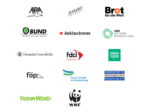By Peter Gerhardt
They exist for wood, paper, palm oil or cod: sustainability labels.
All too often, these have been launched with great fanfare for a better world, only to realise soberly soon after that overexploitation and environmental destruction simply continue. This could be due to the fact that many of these voluntary certification initiatives have a few fundamental flaws built in. The hope is that politics, business and associations will learn from past mistakes and question eco-labels with scepticism. This is particularly true with regard to the current bioeconomy debate, regarding the transformation of our economy from fossil to biological. Here, too, the call for eco-certificates is getting louder.
Already today, the planet is exhausted by the biomass we demand from it: This leads to overfished oceans for Captain Iglo and destroyed rainforests for three-euro chicken. If fossil raw materials are to be completely replaced by biomass in the future, the question consequently arises on which earth this biomass should grow on, or which environmental crimes or human rights violations we might want to accept for that sake. The global distribution of resources could become even more skewed. Because the industrialised nations in the northern hemisphere are not growing enough biomass to keep the turbo-consumption stable, large amounts of biomass will have to be imported.
The same tenor was present at the Global Bioeconomy Summit 2018 in Berlin, a kind of class reunion for the bioeconomy industry. The demand will come as well from countries where corrupt elites are at charge or where a human life costs only $ 1,000. Like in Brazil, where the activist Rosane Santiago Silveira was murdered, in the view of many environmental protection groups, because she was campaigning against industrial eucalyptus plantations of the Suzano group.
There are, of course, positive examples where substituting fossil-based materials with responsibly produced biomass makes sense. If plastic garden chairs are replaced by durable alternatives made of sustainable wood, no one will object. It is also positive if so-called black liquor from paper production is not simply incinerated, but can become in the future the raw material for building materials through bioeconomic processes.
Hence, what could be more obvious than to positively label sustainably produced bioeconomy products with a kind of Eco-TÜV, so that goods with blood sticking to them do not end up in the shopping basket in the first place? Conveniently, eco-labels for biomass from arable crops or timber exist already. The obvious idea is to simply tweak these existing certificates a little so that they would function in a bioeconomy. However, that would not be a good idea, because many of these eco-labels have fundamental flaws.
1. Sustainability labels do not stop expansion
There is one crucial aspect that eco-labels cannot stop: palm oil or cellulose plantations are eating their way further and further into natural ecosystems. The constant expansion is cemented into the DNA of the agricultural and plantation corporations, and the capital interests behind them provide extra pressure. Sustainability certificates are only able to improve the growing conditions on a defined area. However, they do not regulate limits to land use areas and the amount of cultivated crops. The reverse may even be true. Eco-labels may increase consumer demand and ensure that plantation corporations continue to grow at the expense of landless people and smallholders.
Moreover, the labels cannot prevent the possible occurrence of an effect called ILUC (indirect land use change) in the technical debate. The underlying fact is that global markets are interconnected. Even if an eco-label succeded in protecting a piece of Indonesian rainforest in Borneo from being cleared by palm oil, the plantations in Uganda might continue to eat their way into nature.
2. At the round table, the stronger wins – hence usually the corporations
Many certificates follow a so-called multi-stakeholder approach, i.e. groups with a legitimate interest (stakeholders) such as social organisations, local people affected, environmental organisations and companies sit down at a round table and finally agree on inidcators that everyone can live with. In theory, this is a compromise in which all parties involved have to make a few concessions. At first that sounds like lived democracy, participation and fairness.
The reality, however, is different. In fact, such processes require enormous resources such as manpower, time and access to information. Particularly large corporations have more than enough of these resources, which at the end of the day can push through their interests against local village communities from the global South, for example. Even large environmental organisations wear themselves out at the negotiating table with the multinationals. This is the case, for example, with the FSC (Forest Stewardship Council) timber label, which was ambitiously launched in 1993 with the help of environmental organisations and has become increasingly industry-friendly over time. Fed up with the industry’s salami tactics to water down the standards more and more, many large environmental organisations like Greenpeace have now left the FSC. In Brazil, progressive activists now even regard the FSC as the green stooge of the detested plantation corporations.
3. Stakeholder ≠ Rightholder
Regardless of whether it is a global palm oil company, an environmental organisation with headquarters in London or a family of farmers on the edge of a palm oil field: if one follows the logic of many eco-labels, all of these participants are stakeholders with a legitimate interest that must be heard and taken into account. With this conceptual trick, of turning everyone involved into stakeholders, the inalienable land rights of local farmers are suddenly negotiable: Rightholders are degraded to stakeholders.
4. Strong audit firms – weak controls
As a rule, certification initiatives such as the FSC do not carry out on-site inspections themselves, but hand over these tasks to professional certifiers. These are often global testing companies such as TÜV or the global industry leader SGS Group with over 90,000 employees and a turnover in the billions. In practice, this leads to the almost insurmountable task that an initiative like the FSC with only a few employees is supposed to monitor the global activities of large international auditing companies.
5. “Race to the bottom” – the level of auditing is steadily decreasing
The auditing companies are in competition with each other and are also paid directly by the companies. In practice, this leads to those auditors and audit firms prevailing who do not look very strictly and interpret the rules as laxly as possible in the interest of their clients. In the long run, there is a risk that the standards of an eco-label will be diluted further and further.
6. Only works satisfactorily under ideal conditions
The labels also have some successes to report. Even critical environmental groups would admit that, for example, ecological minimum standards for FSC certifications in Germany point in the right direction. However, one can almost speak of laboratory conditions here. Germany has an established democracy with separation of powers and criticism of forest management can be voiced without danger to life and limb. This means that the different interests can be taken into account, at least to a limited extent, when awarding the certificate.
But this is by no means the case everywhere. A large part of the biomass comes from the global South, often from countries with corrupt regimes and poorly functioning state structures. It is precisely here that eco-labels often fail to prevent overexploitation and human rights violations. In countries like Brazil, it can be life-threatening to criticise corporations or to demand one’s rights in a certification case. Moreover, local people are neither familiar with the concept of certification nor are they adequately informed about the possible consequences. In addition, in practice, sustainability certificates practically never adhere to the FPIC standards developed by the UN (Free, Prior and Informed Consent). Therefore, local communities should be fully informed before a possible certification and decide for themselves on this basis whether they agree or reject the process.
In many cases, sustainability certificates are green tranquillisers. They often do not address the irresponsibly high resource consumption of the wealthy and do not change the structural power relations that help global corporations to line their pockets at the expense of environmental destruction and human rights violations.







